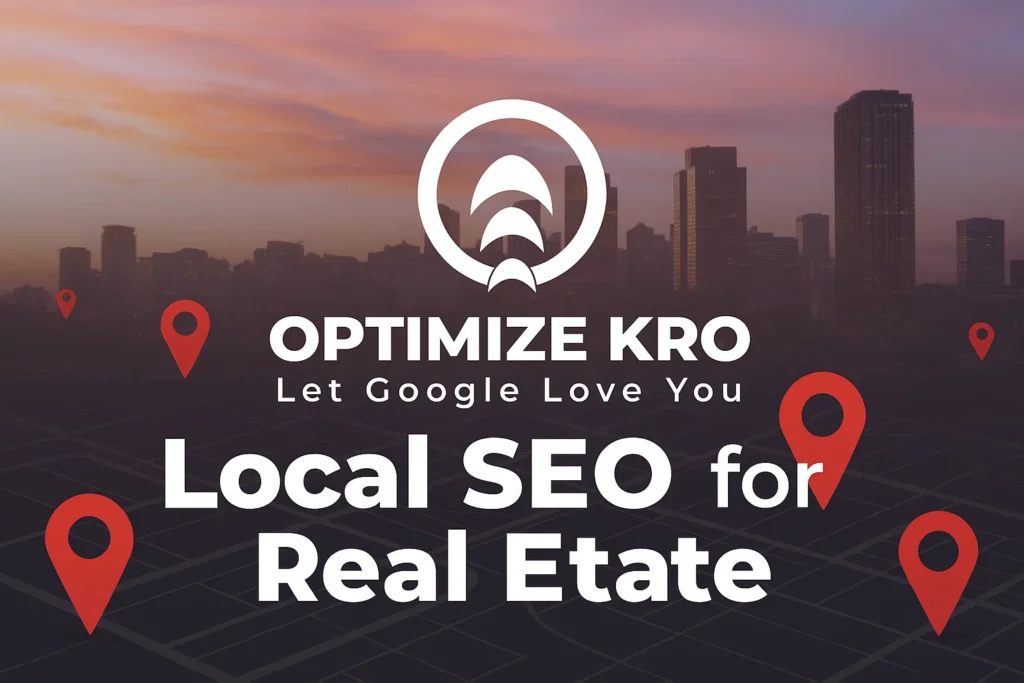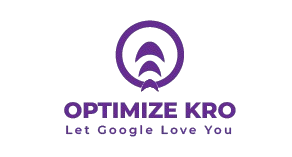In today’s digital age, real estate businesses are no longer solely reliant on traditional marketing methods to generate leads and close deals. One of the most powerful tools for real estate agents to enhance visibility and attract local customers is Local SEO (Search Engine Optimization). Local SEO focuses on optimizing your website and online presence to rank higher in search results, specifically for queries that are geographically relevant.
In this article, we’ll dive into the importance of Local SEO for real estate, the strategies to implement it effectively, and how to leverage it for better leads, visibility, and sales.

What is Local SEO for Real Estate?
Local SEO refers to the practice of optimizing a website and its content to rank higher in search results for location-based queries. For real estate agents and agencies, this means making sure your website appears when potential clients search for terms like:
- “Real estate agents near me”
- “Homes for sale in [City Name]”
- “Best real estate agencies in [Neighborhood]”
Real estate is inherently a local business, and most people looking to buy or rent properties are focused on a specific geographical area. Therefore, optimizing for local search results can help businesses in this niche to get in front of the right audience at the right time.
Why is Local SEO Important for Real Estate?
- Targeting Local Audience
Real estate is highly dependent on local markets, and targeting local customers ensures that your business shows up in front of the right audience at the right time. If someone searches for “luxury apartments in Miami” or “condos for sale in Chicago,” you want your business to be at the top of the search results. - Increase Website Traffic and Visibility
Effective Local SEO can significantly improve the visibility of your real estate website. A better ranking on search engine results pages (SERPs) means more website traffic. With more local customers discovering your business online, your chances of converting these visitors into clients increase. - Build Trust with Customers
When your business appears at the top of local search results, it builds trust with potential clients. People tend to trust businesses that appear in the top results, especially when those businesses are relevant to their search location. Local SEO makes your website more visible, which can help build a solid reputation. - Generate More Leads
Most people looking for a new home or property are already in the decision-making process, so optimizing your real estate website for local search will put you in front of potential buyers and sellers. These individuals are more likely to contact you for a consultation or to inquire about available listings. - Mobile Search Optimization
A significant number of users search for real estate information on their mobile devices. Local SEO is highly beneficial for mobile search, as people use location-based queries to find real estate listings and agents near them.
Key Elements of Local SEO for Real Estate
Effective local SEO requires a combination of on-page optimization, off-page strategies, and technical elements. Let’s look at the core components that play a crucial role in enhancing your local search rankings.
1. Google My Business (GMB) Optimization
One of the most important aspects of local SEO for real estate is optimizing your Google My Business (GMB) profile. GMB is a free tool offered by Google that allows businesses to manage their online presence across Google Search and Google Maps.
- Claim Your GMB Listing: If you haven’t done so already, claim and verify your business on GMB. This ensures that your information is correct and that your business shows up in local search results.
- Complete Your Profile: Fill out all sections of your GMB profile, including the business name, address, phone number, website URL, business hours, and photos.
- Categories and Services: Choose the right categories for your business, such as “Real Estate Agency” or “Real Estate Consultant.” Additionally, list your specific services, such as “Buyers’ Agent,” “Sellers’ Agent,” or “Property Management.”
- Encourage Reviews: Positive reviews on GMB can significantly improve your local SEO ranking. Encourage satisfied clients to leave reviews, and respond to them promptly.
2. Local Keyword Research
Keyword research is at the heart of SEO, and for local SEO, it’s essential to target keywords that are specific to your geographic location. Real estate agents should focus on long-tail keywords that include location names. For example:
- “Homes for sale in [City Name]”
- “Real estate agents in [Neighborhood]”
- “Best real estate agency in [County/State]”
To find local keywords, you can use tools like Google Keyword Planner, Ahrefs, or SEMrush. Look for search terms with a high search volume in your local area, and include these keywords naturally throughout your website content.
3. Optimize Your Website for Local Search
- Title Tags and Meta Descriptions: Ensure that your title tags and meta descriptions are optimized for local keywords. Include the city or neighborhood you’re targeting in both the title and description.
- Location-Specific Pages: Create separate landing pages for each area or neighborhood you serve. These pages should include local information, such as local market trends, community amenities, and property listings.
- NAP Consistency: Ensure that your Name, Address, and Phone Number (NAP) are consistent across all online platforms, including your website, GMB profile, and local business directories. Inconsistent NAP information can hurt your local search rankings.
- Local Content: Include content that speaks directly to the local market. Write blog posts about local market trends, community events, or guides on buying a home in specific neighborhoods.
4. Mobile Optimization
With the rise of mobile searches, optimizing your website for mobile devices is a must. Google prioritizes mobile-friendly websites, especially for local search results. Here’s how you can ensure your site is mobile-friendly:
- Responsive Design: Ensure your website uses a responsive design that adapts to different screen sizes.
- Fast Load Times: Mobile users expect fast load times. Use tools like Google PageSpeed Insights to test your website’s speed and make necessary improvements.
- Clear Contact Information: Ensure your phone number and address are easy to find on your mobile site.
5. Local Citations and Business Directories
Local citations are online mentions of your business on local websites and business directories. These citations help search engines understand that your business is relevant to a particular location. Make sure your business is listed on trusted local and real estate directories, such as:
- Yelp
- Zillow
- Realtor.com
- Yellow Pages
- Angie’s List
Ensure that your NAP information is consistent across all citations and directories.
6. Building Backlinks from Local Websites
Backlinks are a major ranking factor in SEO, and building backlinks from local websites can significantly improve your local search rankings. Some effective ways to build local backlinks include:
- Partnering with Local Businesses: Collaborate with local businesses or sponsors to exchange backlinks.
- Local News Websites: Get featured on local news websites or community blogs.
- Sponsorships and Events: Sponsor local events or charities and get backlinks from their websites.
7. Local Social Media Engagement
Social media can indirectly influence your local SEO. By actively engaging with your community on social platforms, you increase your visibility and authority. Use platforms like Facebook, Instagram, and LinkedIn to share:
- Local listings
- Success stories
- Market updates
- Community events
Encourage clients to tag your business in their posts and reviews, as this helps to strengthen your local online presence.
FAQ: Local SEO for Real Estate
1. How long does it take to see results from Local SEO for real estate?
Local SEO can take anywhere from a few weeks to a few months to show noticeable results. Factors like the competitiveness of your market, the optimization of your website, and the consistency of your SEO efforts will influence the time it takes.
2. What are some common mistakes in Local SEO for real estate?
Some common mistakes include:
- Inconsistent NAP information across listings.
- Not optimizing for mobile devices.
- Failing to update Google My Business with current listings and reviews.
- Ignoring local content or community involvement.
3. Do I need a blog for Local SEO?
While not mandatory, having a blog is highly beneficial for Local SEO. Regularly posting about local market trends, neighborhood guides, and property tips can attract more local traffic to your website and improve your rankings.
4. Is Google My Business essential for Local SEO?
Yes, Google My Business is crucial for Local SEO. A fully optimized GMB profile increases your visibility in Google Search and Google Maps, making it easier for potential clients to find your real estate services.
5. How can I get more reviews for my real estate business?
Encourage happy clients to leave reviews on your Google My Business profile, Yelp, and other review sites. You can ask for reviews via email after closing a deal or include review prompts in your email signature or on your website.
Conclusion
Local SEO for real estate is a powerful strategy to increase your online visibility, attract more local clients, and ultimately grow your business. By optimizing your website for local search, improving your Google My Business profile, and focusing on mobile optimization, you can ensure that your real estate business stands out in a competitive market.
Whether you’re just starting with SEO or looking to refine your current strategy, implementing these techniques will help you gain more qualified leads and become a recognized name in your local real estate market.
By combining SEO best practices with ongoing content creation and customer engagement, you’ll have a solid foundation for long-term success in the world of local real estate marketing.
